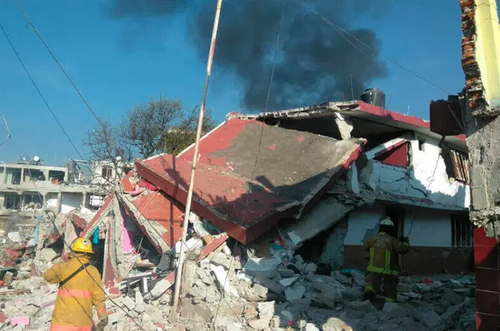Mexican Thieves Stealing $1 Billion Of Liquefied Petroleum Gas A Year
In a dangerous game of wack-a-mole, Mexico nearly eliminated rampant gasoline pipeline thefts only to now see cartels and common thieves stealing $1 billion worth of liquified petroleum gas (LPG) each year from state-owned Petroleos Mexicanos, or Pemex.
Under Mexican President Andrés Manuel López Obrador, theft from gasoline and diesel pipelines plummeted 94% after he deployed the National Guard and military surveillance to watch over the supply arteries. The glow of that success has been dulled, however, as criminals have switched to tapping the country’s 1,000 miles of LPG pipelines.
Pemex found more than 2,400 illegal taps last year—up more than 10-fold in just three years. LPG is Mexico’s top source of energy for heating homes and is also used in cooking. The thieves sell directly to homeowners and food merchants, often using trucks disguised to look like legitimate delivery vehicles.
As Bloomberg Businessweek reports:
The scheme starts with a bribe; a Pemex worker is paid to tip off thieves…when LPG is running through a line and tells them where to open the valves. Then comes the dangerous part—siphoning the gas, which unlike gasoline can’t just be poured into a bucket. They must carefully connect a hose to the pipe to funnel the LPG into cylinders.
One LPG thief profiled by Businessweek sells up to 80 cylinders of gas a day for 20 to 30% below the cost of legal fuel, netting an income that’s 40 times the average salary in his southeastern Mexican town. He’s used his earnings to buy fancy clothes, jewelry, family vacations and several plots of land.
Like other black markets, the illicit trade in LPG is marked by violence perpetrated by the fuel thieves, who are called huachicoleros. Security guards and police have come under attacks that are often deadly. There’s also violence among cartels and other thieves fighting to protect territory. Often, fuel theft is just one of an array of criminal enterprises pursued by criminal groups.
Some casualties associated with the trade are purely accidental. Residential explosions are on the rise as untrained thieves use unsafe practices in their home installations of the product.
The taps themselves are likewise perilous. In October, an illegal LPG pipeline tap was blamed for a huge explosion that killed one person, injured eight, and damaged 180 homes in San Pablo Xochimehuacán.
The aftermath of an explosion caused by an illegal LPG tap in San Pablo Xochimehuacán (via Mexico News Daily)
LPG is typically composed of a mix of propane and butane. When subjected to modest pressure or cooling, it converts to a liquid form that allows for more energy to be stored and transported in compact containers.
The longer global fuel prices stay elevated as a result of the West’s self-destructive economic warfare, the more this trade will prosper, with bodies and rubble piling higher.
Tyler Durden
Thu, 07/14/2022 – 20:40

